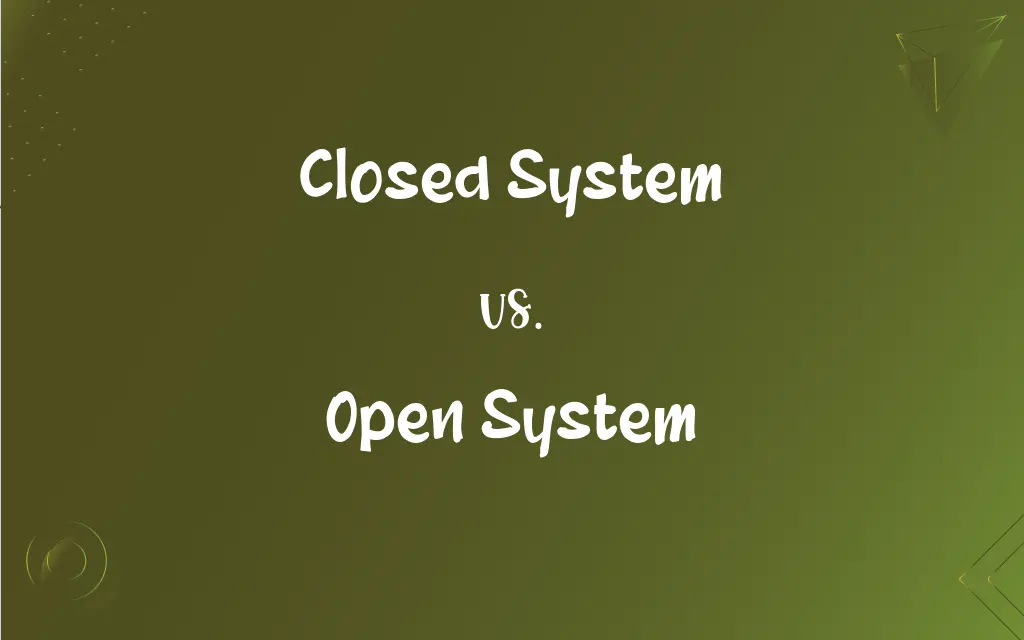Closed System vs. Open System: What's the Difference?
Edited by Aimie Carlson || By Janet White || Published on January 29, 2024
A closed system doesn't exchange matter with its surroundings but may exchange energy, whereas an open system exchanges both energy and matter with its environment.

Key Differences
In a closed system, there is no exchange of matter with the external environment, but energy transfer can occur. An open system freely exchanges both matter and energy with its surroundings.
Closed systems in nature are rare, often idealized in thermodynamics for study, while open systems are more common, like ecosystems. Technological examples include isolated chemical reactions (closed) and living organisms (open).
Closed systems have more predictable and controllable internal conditions due to limited external interaction. Open systems require complex regulation mechanisms to maintain balance due to continuous interaction with their environment.
Closed systems may reach equilibrium more easily but are less adaptable to changes. Open systems are more dynamic and adaptable, constantly evolving with environmental changes.
In business and sociology, closed systems are seen in rigid, self-contained organizations, while open systems are represented by interactive, adaptable organizations.
ADVERTISEMENT
Comparison Chart
Matter Exchange
No exchange of matter with the environment
Exchanges matter with the environment
Energy Exchange
Can exchange energy
Exchanges both energy and matter
Examples
Isolated chemical reactions, insulated systems
Ecosystems, living organisms
Regulation
Easier to maintain internal conditions
Requires complex regulation due to constant interaction
Adaptability
Less adaptable, more stable
More adaptable, constantly evolving
ADVERTISEMENT
Closed System and Open System Definitions
Closed System
Isolated from its environment in terms of material transfer.
A sealed terrarium approximates a closed system.
Open System
Interacts freely with its environment.
A boiling pot of water is an open system, losing water as steam.
Closed System
Maintains more predictable internal conditions.
A closed system allows for controlled experimental conditions.
Open System
Characterized by dynamic and constant change due to interaction.
The human body is an open system, continuously exchanging gases and nutrients.
Closed System
Can exchange energy but not matter with the environment.
In a closed system, a reaction may release heat but not gases.
Open System
Requires mechanisms for dealing with environmental variability.
An open system like a lake adapts to changes in water input and quality.
Closed System
Often used in theoretical models to simplify analysis.
Scientists use closed systems to study thermodynamic processes.
Open System
A system that exchanges both matter and energy with its surroundings.
An ecosystem is an open system, exchanging materials and energy with its environment.
Closed System
A system that does not exchange matter with its surroundings.
A thermos flask is a good example of a closed system.
Open System
Common in natural and social systems.
Modern businesses operate as open systems, interacting with the market.
FAQs
What is an open system?
A system that exchanges both matter and energy with its surroundings.
Can closed systems exchange energy?
Yes, closed systems can exchange energy but not matter.
Do open systems interact with their environment?
Yes, open systems continuously interact with and adapt to their environment.
Can a closed system reach equilibrium?
Yes, closed systems are more likely to reach equilibrium.
What is a closed system?
A system that doesn’t exchange matter but may exchange energy with its environment.
Are ecosystems closed or open systems?
Ecosystems are open systems.
Why are open systems important in business?
They adapt and respond to market and environmental changes.
Is the Earth an open or closed system?
The Earth is an open system in terms of energy but nearly closed for matter.
What are examples of open systems in technology?
Computers and smartphones interacting with networks are open systems.
How do open systems affect sustainability?
They require sustainable practices due to their interaction with the environment.
How do closed systems maintain stability?
By limiting interaction with the environment, leading to predictable internal conditions.
How do closed systems aid scientific research?
They provide a controlled environment for isolated studies.
Can a closed system become open?
Yes, if it starts exchanging matter with its environment.
Are open systems more complex than closed?
Generally, yes, due to their continuous interaction and adaptability.
Can man-made systems be open?
Yes, many man-made systems like cities are open systems.
What makes a system open in sociology?
Open systems in sociology interact with and are influenced by societal factors.
Is a car engine a closed system?
No, it's an open system, exchanging heat and gases with its surroundings.
How do closed systems relate to thermodynamics?
They are often used in thermodynamic studies to simplify the analysis.
Are all biological organisms open systems?
Yes, they exchange matter and energy with their environment.
Do open systems have more variable conditions?
Yes, due to constant interaction with the environment.
About Author
Written by
Janet WhiteJanet White has been an esteemed writer and blogger for Difference Wiki. Holding a Master's degree in Science and Medical Journalism from the prestigious Boston University, she has consistently demonstrated her expertise and passion for her field. When she's not immersed in her work, Janet relishes her time exercising, delving into a good book, and cherishing moments with friends and family.
Edited by
Aimie CarlsonAimie Carlson, holding a master's degree in English literature, is a fervent English language enthusiast. She lends her writing talents to Difference Wiki, a prominent website that specializes in comparisons, offering readers insightful analyses that both captivate and inform.







































































